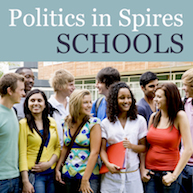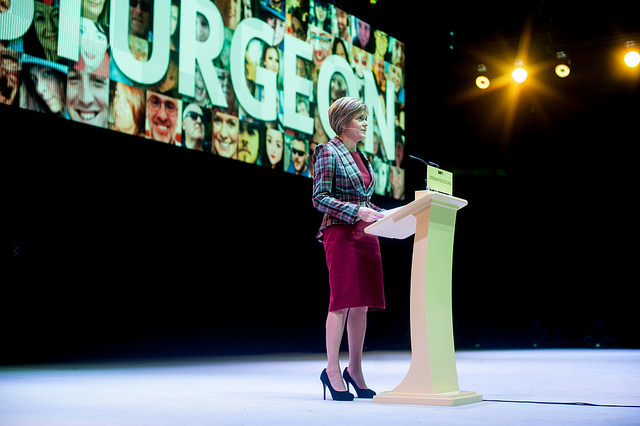 This autumn, in his speech to the Labour party conference, Ed Miliband called for the voting age to be lowered to 16. This follows legislation by the SNP government in Scotland to allow 16 and 17 year olds to vote in the forthcoming referendum on Scottish independence. Explanations of the merits of extending the franchise to younger people normally begin with statements such as ‘if someone’s old enough to X…’ with X replaced by ‘marry’, ‘go to war’, ‘pay taxes’ and so on. We might note that these are, at best, weak arguments since 16 year olds can only marry and join the army with their parents’ permission and even 5 year olds pay tax in the form of VAT when their pocket money is translated into sweets.[1] Either way, it seems likely that the SNP’s decision was not really based on the merits of the case and was simply a narrow electoral consideration. Young people are generally in favour of Scottish independence, so allowing them to vote will increase the proportion of people voting yes. It seems reasonable to think that this is also the major reason why the Labour party is now interested in lowering the voting age in general elections to 16. Young people are seen as more likely to vote Labour, so allowing them to vote will boost Labour’s prospects in future elections. What is never quite clear is whether these are sensible conclusions. Would the entrance of 16 and 17 year olds into the electorate make much difference?
This autumn, in his speech to the Labour party conference, Ed Miliband called for the voting age to be lowered to 16. This follows legislation by the SNP government in Scotland to allow 16 and 17 year olds to vote in the forthcoming referendum on Scottish independence. Explanations of the merits of extending the franchise to younger people normally begin with statements such as ‘if someone’s old enough to X…’ with X replaced by ‘marry’, ‘go to war’, ‘pay taxes’ and so on. We might note that these are, at best, weak arguments since 16 year olds can only marry and join the army with their parents’ permission and even 5 year olds pay tax in the form of VAT when their pocket money is translated into sweets.[1] Either way, it seems likely that the SNP’s decision was not really based on the merits of the case and was simply a narrow electoral consideration. Young people are generally in favour of Scottish independence, so allowing them to vote will increase the proportion of people voting yes. It seems reasonable to think that this is also the major reason why the Labour party is now interested in lowering the voting age in general elections to 16. Young people are seen as more likely to vote Labour, so allowing them to vote will boost Labour’s prospects in future elections. What is never quite clear is whether these are sensible conclusions. Would the entrance of 16 and 17 year olds into the electorate make much difference?
To ascertain this, we need to answer two different questions. First, are young people different in their views to older people? Second, what proportion of voters would 16 and 17 year olds comprise? On the first, it seems like the received wisdom is broadly correct. Younger people are more likely to vote Labour than older people. These differences are not enormous, but are real. Work by Geoff Evans and me has shown that those aged 21 are, on average, 20 percentage points less likely to support the Conservatives than those aged 81 (Tilley and Evans 2013). The reasons for this difference are not easy to establish, but there are three main possibilities. The first is ‘social ageing’: as people get jobs, get married, have children and so forth, levels of stake in the status quo change which affects people’s political choices. The second is ‘psychological ageing’: as people age they become increasingly conservative and authoritarian, which means that they favour parties of the right. The third is ‘generational difference’: as people age their attitudes stay constant, but people born more recently show more enthusiasm for socially liberal policies.[2] Using survey data conducted after every election from 1964 to 2010 we show that it is the psychological ageing explanation that seems the most plausible. In order to do this, we use both statistical models that enable us to hold constant any variables that we think are correlated with age/generation and vote such as income, and also panel data that repeatedly survey the same people over long periods of time so we can estimate how people change as they age.
If people become more conservative, and hence more Conservative, as they age, then it seems likely that 16 year olds will not behave terribly differently to 18 year olds. Of people who voted in 2010, about half of 18 and 19 year olds voted Labour (2010 British Election Study). This is not far off double the 29 per cent that Labour received from the electorate as a whole. But the impact of including 16 and 17 year olds in the electorate is also about the relative size of the group. According to the 2011 census, 16 and 17 year olds make up less than 3 per cent of the population aged over 16. Moreover it is likely that few would actually choose to vote. The British Election Study shows that only around 40 per cent of 18 and 19 year olds turned out in the last general election compared to two thirds of the electorate as a whole. Over 98 per cent of people who actually vote would therefore be 18 and over. The impact of extending the franchise benefits Labour, but only very marginally. Using the figures above as guidelines, Labour’s vote share would have increased by less than 0.4% in 2010. This is hardly an epoch shaking change.
Moreover the tepid support of parts of the Labour party for these changes may also reflect wider problems of Labour’s support base. Increasingly some parties of the left are becoming parties of several sectional parts rather than broad based coalitions. For example Labour currently wins large proportions of votes from non-whites (around 10 per cent of the electorate), public sector trade unionists (another 10 per cent of the electorate) and working age people whose main income is via the welfare system (another 10 per cent of the electorate). One might argue that high levels of support among narrowly defined groups, often with narrowly defined policy aims, could be problematic for a party given the potentially conflicting objectives of these groups. Adding ‘the young’, another small group which tends not to vote, to this list might actually cause more problems than it solves. Ultimately therefore the decision to extend voting rights to younger people will depend on both whether Labour wins the next election and crucially whether the party sees it as advantageous to increase its vote share slightly at the expense of becoming more reliant on a coalition of disparate interests.
References
Philip Cowley and David Denver (2004) ‘Votes at 16? The case against’, Representation 41:1, 57-62.
James Tilley and Geoff Evans (2011) ‘Political generations in Northern Ireland’, European Journal of Political Research 50(5): 583-608.
James Tilley and Geoff Evans (2013), ‘Ageing and generational effects on vote choice: Combining cross-sectional and panel data to estimate APC effects’, Electoral Studies (forthcoming)
[1] See Cowley and Denver (2004) for an excellent discussion of this.
[2] Another type of generational difference results from the impact of the political ‘spirit of the times’ on people as they enter the electorate. For example, in Northern Ireland newer generations are consistently much more likely to support the DUP and Sinn Fein. This is largely due to the fact that newer cohorts of voters have come of age in an environment in which these parties have been more prominent and more successful due to the peace process and its consequences (Tilley and Evans 2011).







1 Comment